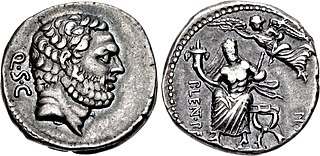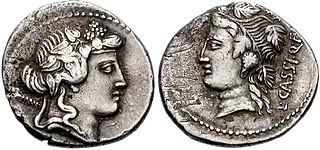Related Research Articles

Lucius Sergius Catilina, known in English as Catiline, was a Roman politician and soldier, best known for instigating the Catilinarian conspiracy, a failed attempt to violently seize control of the Roman state in 63 BC.
Year 63 BC was a year of the pre-Julian Roman calendar. At the time it was known as the Year of the Consulship of Cicero and Hybrida. The denomination 63 BC for this year has been used since the early medieval period, when the Anno Domini calendar era became the prevalent method in Europe for naming years.

The Catilinarian orations are four speeches given in 63 BC by Marcus Tullius Cicero, one of the year's consuls. The speeches all related to the discovery, investigation, and suppression of the Catilinarian conspiracy, a plot that year to overthrow the republic. All of the speeches in the form available today were published, probably around 60, as part of Cicero's attempt to justify his actions during the consulship; whether they are accurate reflections of the original speeches in 63 is debated.

Gaius Sallustius Crispus, usually anglicised as Sallust, was a historian and politician of the Roman Republic from a plebeian family. Probably born at Amiternum in the country of the Sabines, Sallust became a partisan of Julius Caesar, circa 50s BC. He is the earliest known Latin-language Roman historian with surviving works to his name, of which Conspiracy of Catiline on the eponymous conspiracy, The Jugurthine War on the eponymous war, and the Histories remain extant. As a writer, Sallust was primarily influenced by the works of the 5th-century BC Greek historian Thucydides. During his political career he amassed great and ill-gotten wealth from his governorship of Africa.

Publius Cornelius Lentulus Spinther was a Roman politician and general. Hailing from the patrician family of the Cornelii, he helped suppress the Catilinarian conspiracy during his term as curule aedile in 63 BC and later served as consul in 57 BC. Denied the opportunity to invade Egypt the following year, he nevertheless won some victories in his province of Cilicia and celebrated a triumph over it in 51 BC.
Publius Cornelius Lentulus Sura was one of the chief figures in the Catilinarian conspiracy. He was also the step-father of the future triumvir Mark Antony.
Julia was the mother of the triumvir general Mark Antony.
Publius Cornelius Sulla was a politician of the late Roman Republic and the nephew of Lucius Cornelius Sulla. He was also a brother-in-law of Pompey, having married his sister Pompeia.
Lucius Aurelius Cotta was a Roman politician from an old noble family who held the offices of praetor, consul and censor. Both his father and grandfather of the same name had been consuls, and his two brothers, Gaius Aurelius Cotta and Marcus Aurelius Cotta, preceded him as consul in 75 and 74 BC respectively. His sister, Aurelia, was married to Gaius Julius Caesar, brother-in-law to Gaius Marius and possibly Lucius Cornelius Sulla, and they were the parents of the famous general and eventual dictator, Gaius Julius Caesar.
Publius Autronius Paetus was a politician of the late Roman Republic who was involved in the conspiracy of Catiline.
The Battle of Pistoria was fought early January 62 BC between the forces of the Roman Republic and Catiline, a senatorial conspirator who had been organising an attempted conspiracy against the consuls the previous year.

The gens Cornelia was one of the greatest patrician houses at ancient Rome. For more than seven hundred years, from the early decades of the Republic to the third century AD, the Cornelii produced more eminent statesmen and generals than any other gens. At least seventy-five consuls under the Republic were members of this family, beginning with Servius Cornelius Maluginensis in 485 BC. Together with the Aemilii, Claudii, Fabii, Manlii, and Valerii, the Cornelii were almost certainly numbered among the gentes maiores, the most important and powerful families of Rome, who for centuries dominated the Republican magistracies. All of the major branches of the Cornelian gens were patrician, but there were also plebeian Cornelii, at least some of whom were descended from freedmen.
Lucius Julius Caesar was a Roman politician and senator who was consul in 64 BC. A supporter of his cousin, the Roman dictator Gaius Julius Caesar, Lucius was a key member of the senatorial coalition which strove to avoid civil war between the Senate and his nephew Mark Antony in the aftermath of Caesar's assassination in 44 BC.

The gens Annia was a plebeian family at ancient Rome. Livy mentions a Lucius Annius, praetor of the Roman colony of Setia, in 340 BC, and other Annii are mentioned at Rome during this period. Members of this gens held various positions of authority from the time of the Second Punic War, and Titus Annius Luscus attained the consulship in 153 BC. In the second century AD, the Annii gained the Empire itself; Marcus Aurelius was descended from this family.
The so-called first Catilinarian conspiracy was an almost certainly fictitious conspiracy in the late Roman Republic. According to various ancient tellings, it involved Publius Autronius Paetus, Publius Cornelius Sulla, Lucius Sergius Catilina, and others. Ancient accounts of the alleged conspiracy differ in the participants; in some tellings, Catiline is nowhere mentioned. Autronius and Sulla had been elected consuls for 65 BC but were removed after convictions for bribery. New consuls were then elected. The supposed goal of the conspiracy was to murder the second set of consuls elected for 65 BC and, in their resulting absence, replace them.

The Catilinarian conspiracy, sometimes Second Catilinarian conspiracy, was an attempted coup d'état by Lucius Sergius Catilina (Catiline) to overthrow the Roman consuls of 63 BC – Marcus Tullius Cicero and Gaius Antonius Hybrida – and forcibly assume control of the state in their stead.
Lucius Calpurnius Bestia was a Roman politician, and one of the Catilinarian conspirators.

Lucius Cassius Longinus was a Roman politician and a participant in the conspiracy of Catilina.
Lucius Vettius was a Roman equestrian informer who informed on the Second Catilinarian conspiracy in 63 BC and later, in 59 BC, denounced a supposed plot of many conservative-leaning senators to murder Pompey. He was jailed and then found dead.
The gens Umbrena was an obscure plebeian family at ancient Rome. Hardly any members of this gens appear in history, of whom the best known may have been Publius Umbrenus, one of the Catilinian conspirators in 63 BC. A few others are known from inscriptions.
References
- ↑ One or more of the preceding sentences incorporates text from a publication now in the public domain : Chisholm, Hugh, ed. (1911). "Cethegus s.v. Gaius Cornelius Cethegus". Encyclopædia Britannica . Vol. 5 (11th ed.). Cambridge University Press. p. 775.
- ↑ Sallust, Catalinarian Conspiracy, XLVII.
- ↑ Cicero, Catilinarian Orations, 3.3
- ↑ Sallust, Catilinarian Conspiracy, LV